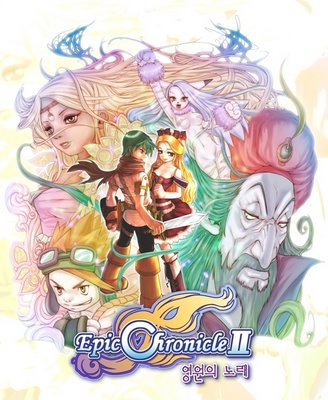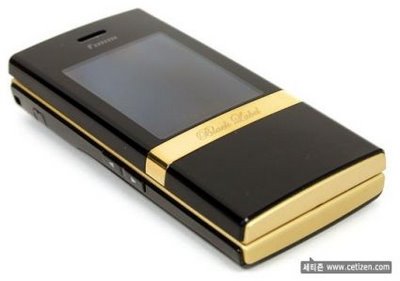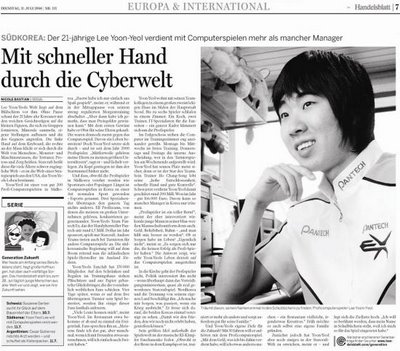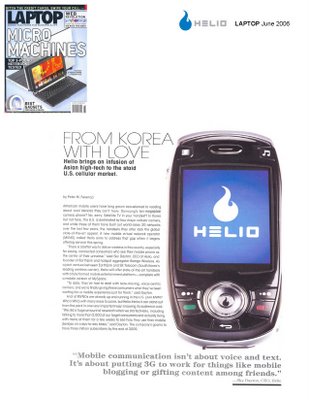This is an intersting article on what South Korea can provide to the rest of the world written by Business 2.0.
The future is in South KoreaSmart investments in broadband there have paid off in the form of a hyperconnected society -- here's how we can start reaping the benefits.
By Chris Taylor, Business 2.0 Magazine senior editor
June 14, 2006
SAN FRANCISCO (Business 2.0 Magazine) - I, for one, welcome our South Korean overlords.
Ninety percent of the country has blazingly fast, 3-megabits-per-second broadband at home, and similarly high-speed wireless connections on the road. The telecom market is fiercely competitive, and broadband service costs the consumer less than $20 a month.
There are 20,000 PC baangs, or Internet cafes, where you can rent a superfast machine for $1 an hour. Online gaming has become a way of life, with nearly 3,000 South Korean videogame companies boasting combined revenues of up to $4 billion.
As a result, South Korea has become the world's best laboratory for broadband services - and a place to look to for answers on how the Internet business may evolve.
Smart bet on broadband
How did this come about? In 1995, the South Korean government made what must rank as one of the most shrewd and far-sighted investments in business history. It spent big on a nationwide high-capacity broadband network that any telecom operator could offer service on, and offered subsidies so that 45 million Koreans could buy cheap PC's. Cost: a mere $1.5 billion.
Fast-forward 11 years: Korea is now the most connected and Net-addicted country on Earth. There are a few American companies who have benefited from the South Korean broadband boom: Blizzard, for example, makes a popular online game called Starcraft which is so widely played in South Korea that two TV channels broadcast Starcraft matches between professional players.
But the most popular services are homegrown.
Cyworld, for example, is a social network owned by a subsidiary of SK Telecom, the country's largest wireless provider. To an American eye, the Cyworld service looks like a mixture of some of the hottest US properties: it's MySpace meets Flickr and Blogger and AIM and Second Life.
Users have avatars that visit and can link to each other's "minihompy" - a miniature homepage that's actually a 3-D room containing a users' blog, photos, and virtual items for sale. Cyworld's digital garage sales include music, ringtones, clothes for your avatar and furnishings for your own minihompy.
Cyworld has penetration rates that would make Rupert Murdoch, CEO of MySpace parent News Corp. (Research), green with envy: An astonishing 90 percent of South Koreans in their 20s use the service. Celebrities and politicians set up their own minihompies, and the way to get ahead in twentysomething Korean society is to found a popular Cyworld club, or chat room.
Printing money
Most importantly, Cyworld is a license to print money. The service itself is free (and available on cellphones as well as online), but to buy all the extras - like ringtones and virtual furnishings - will cost you "acorns," the service's virtual currency. Cyworld sells its users $300,000 in acorns every single day.
With such a proven revenue stream, Cyworld is expanding fast. It launched in China and Japan last year, and a US launch is slated for later this year.
Some might dismiss it as a Korean novelty, but all of Cyworld's elements, individually, have been successful on these shores. And teens and twentysomethings who use social networks tend not to have much brand loyalty to one service if another offers cooler features. SK Telecom's ace in the hole is its experience with running a social network on mobile devices.
"Every social network is going to have to have a mobile component over the next year," predicts Jill Aldort, an analyst at Yankee Group. "It gives more stickiness to the service. There's going to be a social networking fatigue factor - users need novelty. And Cyworld clearly has more functionality than MySpace."
Whether or not Cyworld succeeds in the U.S., South Korea is going to continue aggressively targeting American Internet users. Its government has set a target of $1 billion a year in online game exports by 2007.
NCSoft, the company that runs Korea's most popular multiplayer online role-playing game, Lineage, has found a string of successes in the U.S. by learning quickly what Americans love: its City of Heroes and City of Villains online games were both number one hits here.
Lost in translation?
To be sure, there is much about South Korean culture that doesn't translate well. The country's love of cuteness is a little too saccharine for American tastes.
And part of Cyworld's success can be chalked up to users' incessant message-swapping - not answering a missive from a friend with all due speed is considered a faux-pas in Korean society.
There is a chance that the rise of broadband and the rise of online gaming will not be so interlinked on this side of the Pacific (though the runaway success of World of Warcraft suggests otherwise). There's a chance that US social networkers may prefer a stripped-down service with no avatars, bells or whistles.
But don't forget that US wireless operators used to dismiss Japanese advances in mobile phones in much the same way. Do users really want to send text messages, watch video on their phones, or buy ringtones, they mused, or is that something peculiar to Japan? Well, as it turned out, they do, and companies that bet early on the notion that technology can cross cultural boundaries, like Sprint Nextel (Research) and Cingular, won out.
So think twice before ignoring what's going on in Seoul. That shrewd government investment a decade ago may just have created a broadband hothouse that can give us a glimpse of the Internet culture's future.

 Nexonmobile is to concurrently roll out three games in genre of casual game, sports game, and role playing game aiming to dominate the market in summer. The company targets diverse age groups with 'Crazy Arcade B&B 2007', 'Crazy Baseball' a mobile games based on the popular online game'Crazy Arcade' and 'Epic Chronicle II' a large-scaled RPG game.
Nexonmobile is to concurrently roll out three games in genre of casual game, sports game, and role playing game aiming to dominate the market in summer. The company targets diverse age groups with 'Crazy Arcade B&B 2007', 'Crazy Baseball' a mobile games based on the popular online game'Crazy Arcade' and 'Epic Chronicle II' a large-scaled RPG game.






